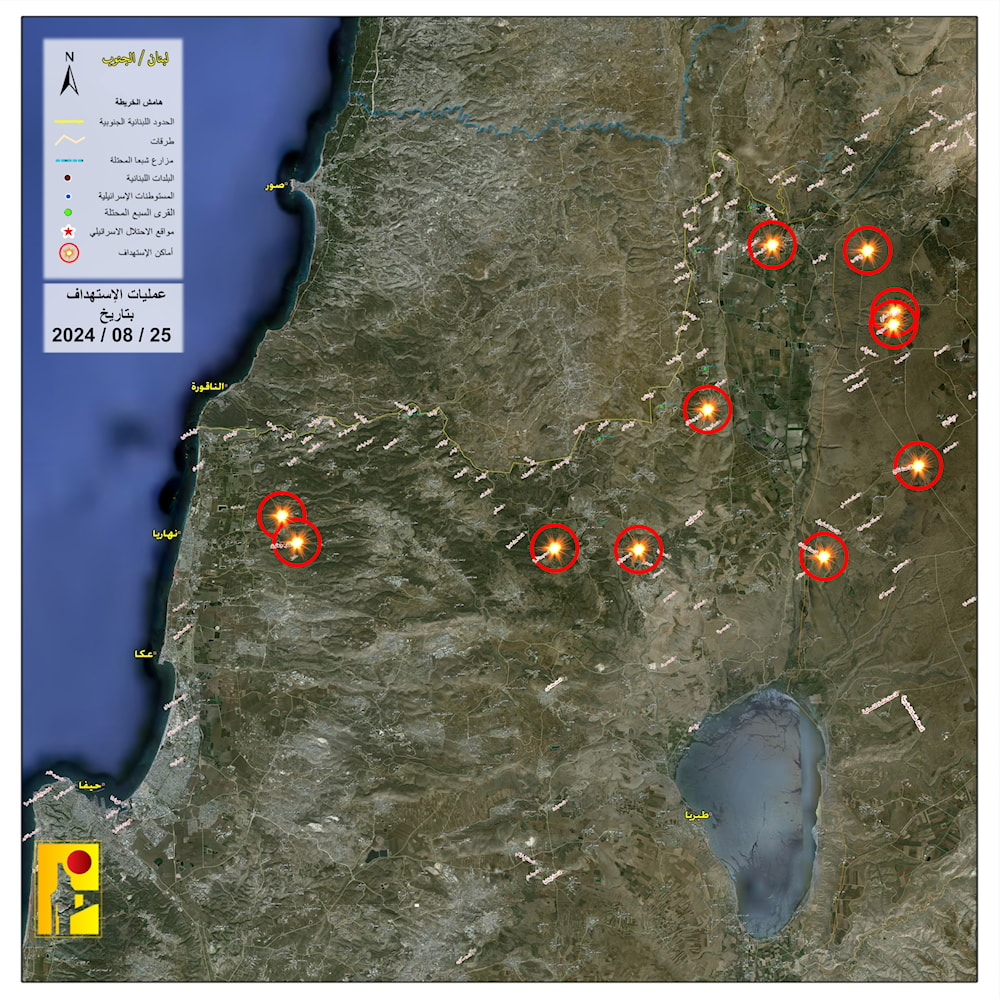Fact-check: Hezbollah's Secretary General debunks Israeli claims
After Hezbollah launched Operation Arbaeen deep into the occupied territories, Israeli media, citing military officials, quickly overwhelmed the public with claims that they had successfully intercepted thousands of rockets aimed at the capital. However, Hezbollah’s Secretary General soon debunked these claims, exposing them as deliberate misinformation.
-

Map released by the Islamic Resistance in Lebanon of Operation Arbaeen's successful targets in the occupied territories on August 25, 2024. (Hezbollah Military Media)
Israeli media claimed that the Israeli Occupation Forces (IOF) successfully thwarted Hezbollah's operation in retaliation for the assassination of commander Fouad Shokor, asserting that they struck Hezbolah's rocket launchers in Lebanon before they could be fired.
Earlier today, dubbing the response Operation Arbaeen, the Secretary General of Hezbollah Sayyed Nasrallah reflected on the details of the operation and debunked Israeli claims that preceded and followed it. He stressed that the Israeli account of the events was "full of lies," reflecting the inherent weakness of the Israeli entity.
How many missiles were launched by Hezbollah?
Israeli media, citing Israeli military sources, first claimed that "some 210 rockets and some 20 drones were launched from Lebanon at northern Israel in Hezbollah’s attack."
Sayyed Nasrallah debunked the claims stating that, "Our initial plan was to launch 300 missiles in this operation, but we launched 340 missiles, and the enemy did not thwart anything," revealing a number that surpassed "Israel's" false claims.
Did 'Israel' strike Hezbollah's rocket launchers?
Furthermore, Israeli media reported that the Israeli occupation announced that "thousands of Hezbollah rocket launchers were struck simultaneously by some 100 IAF fighter jets in the preemptive attacks," in which Sayyed Hassan stressed that "the enemy's claims about bombing strategic and precise missiles that were prepared to target Tel Aviv are a lie upon a lie," noting that the Resistance, with a clear and precise strategy, had no intention of using such weapons.
Concerning the Israeli claims of striking Hezbollah targets across southern Lebanon, Israeli media reported that "Israeli fighter jets simultaneously struck thousands of Hezbollah targets across southern Lebanon early Sunday morning, in what the military said was a preemptive operation against weaponry that was about to be used in a major attack on central and northern Israel."
To that, Sayyed Nasrallah said that the sites targeted by the occupation army this morning on the outskirts of towns were either empty or had been evacuated at the request of martyr Shokor.
Did Israeli intelligence know?
In an effort to conceal their intelligence failure, Israeli media cited Israeli officials claiming that the "preemptive strikes specifically targeted the sites in southern Lebanon that would have been used in the attack."
On the other hand, Sayyed Hassen highlighted that "All the platforms that were intended to launch missiles were not hit before the operation, and only two platforms were hit after the operation."
In the same context, Israeli media reported that the Israeli occupation "had identified overnight preparations in Hezbollah’s rocket array for a major and immediate attack on Israel. Fighter jets began to 'remove the threat' shortly before 5 am," adding, "The New York Times first reported the strikes targeted launchers primed to fire in the direction of Tel Aviv at 5 am."
However, Hezbollah's Secretary General confirmed that "the enemy did not have any intel, and its raids that preceded the operation by an hour were the result of the natural movement of the Resistance fighters."
'Mossad HQ near Tel Aviv in ‘mostly’ foiled barrage'
Israeli media reported that "according to unofficial Israeli assessments leaked to the press and cleared for publication by the military censor, Hezbollah planned to launch missiles at the Glilot base near Herzliya, home to Mossad headquarters and several IDF intelligence units, including its high-profile signals intelligence group Unit 8200," adding that "No IDF bases were damaged in the attack, and none of the Hezbollah drones impacted targets in central Israel, according to the military."
In his speech, Sayyed Hassan revealed that the primary targets of today's operation were the central Glilot base of Israeli military intelligence Aman section and Unit 8200 cyber unit, located near Tel Aviv, and the Ein Shemer airbase.
In response to the Israeli claims, falsifying the success of the operation, he emphasized that the resistance would monitor the outcome of the enemy's concealment of outcome regarding the two targeted bases. He explained that if the response is deemed satisfactory, it will be considered sufficient for addressing the assassination crime. However, if it falls short, the resistance reserves the right to continue and escalate the response.

 4 Min Read
4 Min Read








